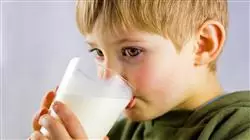University certificate
The world's largest faculty of nutrition”
Introduction to the Program
The study of the human Microbiota of pediatric patients increases the competencies of nutritionists, enabling them to practice with patients of different ages"

Numerous pieces of scientific evidence have implicated the intestinal microbiome and its metabolic potential in various pathological conditions in recent years, giving rise to new therapeutic strategies to control and regulate this ecosystem. The study of this ecosystem is a field that is rapidly advancing scientifically, and it is universally accepted that to achieve an adequate state of health it is also necessary to have a "healthy" Microbiota.
Our microbiota undergoes changes as a consequence of the influence of multiple factors, diet, lifestyle, pharmacological treatments.... generating alterations in this bacterial ecosystem and the abnormal interaction that the organism could have with it, is related to certain processes: allergic, acute and chronic intestinal diseases, obesity and metabolic syndrome, neurological diseases, dermatitis and other alterations in the dermis, and even some types of cancer.
n this sense, this Postgraduate diploma in Microbiota in Neonatology and Pediatrics for Nutritionists, gives the ease of access to information and the interest aroused among the general population on issues related to the Microbiota, its Eubiosis and Dysbiosis, problems related to them, Probiotics and Prebiotics with the growing market launch of new products with very specific strains for very specific problems and diseases ... etc..
All this makes it necessary for nutrition professionals to be up to date with all the scientific advances in this regard, in order to offer pediatric patients a diet adapted to their needs, guiding them to recover and maintain this bacterial Eubiosis to recover a good state of health, in addition to collaborating in a positive way with the recommended medical treatment.
Improve your knowledge in Human Microbiota in children and adolescents through this program, where you will find the best didactic material with real cases"
This Postgraduate diploma in Microbiota in Neonatology and Pediatrics for Nutritionists contains the most complete and up-to-date scientific program on the market. The most important features include:
- Development of practical cases presented by experts in Microbiota in Neotology and Pediatrics. The graphic, schematic, and eminently practical contents with which they are created provide scientific and practical information on the disciplines that
- are essential for professional practice
- New developments on Microbiota in Neonatology and Pediatrics
- It contains practical exercises where the self-evaluation process can be carried out to improve learning
- Special emphasis on innovative methodologies in Microbiota in Neonatology and Pediatrics
- All this will be complemented by theoretical lessons, questions to the expert, debate forums on controversial topics, and individual reflection assignments
- Content that is accessible from any fixed or portable device with an Internet connection
This Postgraduate diploma is the best investment you can make in the selection of a refresher program for two reasons: in addition to updating your knowledge in Microbiota in Neonatology and Pediatrics, you will obtain a certificate from one of the most reputable educational institutions: TECH
The program includes, in its teaching staff, professionals from the fields of medicine and nursing, who bring to this training the experience of their work, as well as recognized specialists from prestigious reference societies and universities.
The multimedia content, developed with the latest educational technology, will provide the professional with situated and contextual learning, i.e., a simulated environment that will provide immersive training programmed to train in real situations.
This program is designed around Problem Based Learning, whereby the professional must try to solve the different professional practice situations that arise during the academic year. The professional will be assisted by an innovative interactive video system created by renowned and experienced experts in sports nutrition.
The Postgraduate diploma allows you to exercise through simulated environments, which provide immersive learning programmed to train for real situations"

This 100% online course will allow you to combine your studies with your professional work while expanding your knowledge in this field"
Why study at TECH?
TECH is the world’s largest online university. With an impressive catalog of more than 14,000 university programs available in 11 languages, it is positioned as a leader in employability, with a 99% job placement rate. In addition, it relies on an enormous faculty of more than 6,000 professors of the highest international renown.

Study at the world's largest online university and guarantee your professional success. The future starts at TECH”
The world’s best online university according to FORBES
The prestigious Forbes magazine, specialized in business and finance, has highlighted TECH as “the world's best online university” This is what they have recently stated in an article in their digital edition in which they echo the success story of this institution, “thanks to the academic offer it provides, the selection of its teaching staff, and an innovative learning method aimed at educating the professionals of the future”
A revolutionary study method, a cutting-edge faculty and a practical focus: the key to TECH's success.
The most complete study plans on the university scene
TECH offers the most complete study plans on the university scene, with syllabuses that cover fundamental concepts and, at the same time, the main scientific advances in their specific scientific areas. In addition, these programs are continuously being updated to guarantee students the academic vanguard and the most in-demand professional skills. In this way, the university's qualifications provide its graduates with a significant advantage to propel their careers to success.
TECH offers the most comprehensive and intensive study plans on the current university scene.
A world-class teaching staff
TECH's teaching staff is made up of more than 6,000 professors with the highest international recognition. Professors, researchers and top executives of multinational companies, including Isaiah Covington, performance coach of the Boston Celtics; Magda Romanska, principal investigator at Harvard MetaLAB; Ignacio Wistumba, chairman of the department of translational molecular pathology at MD Anderson Cancer Center; and D.W. Pine, creative director of TIME magazine, among others.
Internationally renowned experts, specialized in different branches of Health, Technology, Communication and Business, form part of the TECH faculty.
A unique learning method
TECH is the first university to use Relearning in all its programs. It is the best online learning methodology, accredited with international teaching quality certifications, provided by prestigious educational agencies. In addition, this disruptive educational model is complemented with the “Case Method”, thereby setting up a unique online teaching strategy. Innovative teaching resources are also implemented, including detailed videos, infographics and interactive summaries.
TECH combines Relearning and the Case Method in all its university programs to guarantee excellent theoretical and practical learning, studying whenever and wherever you want.
The world's largest online university
TECH is the world’s largest online university. We are the largest educational institution, with the best and widest online educational catalog, one hundred percent online and covering the vast majority of areas of knowledge. We offer a large selection of our own degrees and accredited online undergraduate and postgraduate degrees. In total, more than 14,000 university degrees, in eleven different languages, make us the largest educational largest in the world.
TECH has the world's most extensive catalog of academic and official programs, available in more than 11 languages.
Google Premier Partner
The American technology giant has awarded TECH the Google Google Premier Partner badge. This award, which is only available to 3% of the world's companies, highlights the efficient, flexible and tailored experience that this university provides to students. The recognition as a Google Premier Partner not only accredits the maximum rigor, performance and investment in TECH's digital infrastructures, but also places this university as one of the world's leading technology companies.
Google has positioned TECH in the top 3% of the world's most important technology companies by awarding it its Google Premier Partner badge.
The official online university of the NBA
TECH is the official online university of the NBA. Thanks to our agreement with the biggest league in basketball, we offer our students exclusive university programs, as well as a wide variety of educational resources focused on the business of the league and other areas of the sports industry. Each program is made up of a uniquely designed syllabus and features exceptional guest hosts: professionals with a distinguished sports background who will offer their expertise on the most relevant topics.
TECH has been selected by the NBA, the world's top basketball league, as its official online university.
The top-rated university by its students
Students have positioned TECH as the world's top-rated university on the main review websites, with a highest rating of 4.9 out of 5, obtained from more than 1,000 reviews. These results consolidate TECH as the benchmark university institution at an international level, reflecting the excellence and positive impact of its educational model.” reflecting the excellence and positive impact of its educational model.”
TECH is the world’s top-rated university by its students.
Leaders in employability
TECH has managed to become the leading university in employability. 99% of its students obtain jobs in the academic field they have studied, within one year of completing any of the university's programs. A similar number achieve immediate career enhancement. All this thanks to a study methodology that bases its effectiveness on the acquisition of practical skills, which are absolutely necessary for professional development.
99% of TECH graduates find a job within a year of completing their studies.
Postgraduate Diploma in Microbiota in Neonatology and Pediatrics
Discover the fascinating world of microbiota and its impact on the health of newborns and children. At TECH Global University we present our Postgraduate Diploma program in Microbiota in Neonatology and Pediatrics, designed to provide you with the knowledge and skills necessary to understand and effectively address the importance of the microbiota in this crucial stage of human development. Our online classes offer you the convenience and flexibility to learn from anywhere, anytime. With just an Internet-enabled device, you can access program materials and participate in interactive sessions led by experts in the field of microbiota in neonatology and pediatrics. In this postgraduate course you will explore in depth the importance of the gut microbiota in the development and well-being of neonates and children. You will learn about the factors that influence the composition of the microbiota, the implications of microbiotic imbalances and strategies to promote a healthy microbiota. In addition, you will become familiar with the latest research and advances in the field, and how to apply them in clinical practice.
Acquire all the knowledge to have a healthy microbiota.
TECH Global University is proud to offer a cutting-edge academic program taught by recognized experts in the field of microbiota in neonatology and pediatrics. Through a practical and evidence-based approach, you will acquire the skills necessary to assess and promote microbiota health at this crucial stage of life. Upon completion of our postgraduate program, you will be prepared to make a significant difference in the health and well-being of newborns and children. You will be able to apply your knowledge to prevent and address microbiota-related disorders, thus improving the quality of life of your patients. Take advantage of this unique opportunity to expand your knowledge and advance your career by enrolling now and be part of the vanguard in children's health care!







